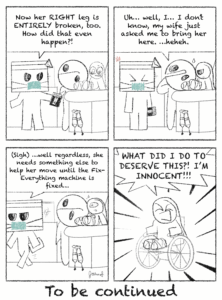‘Brother, sorry brother. Can you help me?”
‘Two rand for milk and bread?”
I look at him a beggar with a bright neon security vest, guarding cars shake my head and walk into a 7-Eleven looking for skim milk, which hardly exists here. They seem to only have whole and two percent milk in stock. Damn it.
‘I live on the streets,” the man said. ‘You and me, when we die, we all go to the same place.”
I turn the corner back to my home here in Cape Town, South Africa. Another bergie (a term used for beggars in Cape Town) comes up to me.
‘Hey brother, sorry brother,” he said. ‘I just want to talk brother. Can you help me?”
They all say the same thing. You become inured to it.
Every day it’s the same routine. The same route home. The same bergies follow you 20 feet begging. Sometimes, though, it’s a bit different.
When I was walking into ShopRite, looking for skim milk again, a Canadian came up to me.
‘Can you help me?” he asked. ‘Give me $20? Me and my three buddies just had our wallets and passports stolen on a minibus taxi. We need to get to Stellenbosch to get to my embassy.”
He still had his cellphone. Did they steal everything except his cellphone? Why would the Canadian embassy be in the town of Stellenbosch, over an hour away from the city of Cape Town?
Bizarre things happen. Theft is rampant. My friend Dan Huntington had his cellphone stolen on a minibus taxi. He was the last off, and the driver asked to borrow his phone. Dan ended up running down the street with his hand still on the phone as the taxi drove away.
If it isn’t a bergie, it’s a refugee. Twice in one day I was followed home for a kilometer by the same man. The first time I saw him he asked for money for food. When I saw him again he had a shopping bag full of food. I didn’t ask how he got the bread and milk.
‘I’m a good man,” he said. ‘I’m a Christian man. Can you help me? Let me tell you my story. I’m from Zimbabwe. I need money to get an identity photo for work.”
There’s a drug here called tik. It’s like meth, but mixed with household cleaners. I was on a train to see the African Penguins, also known as the Jackass Penguins, in Simonstown.
There was a man tripping. He made a pass at me, grabbing for my bag. Another man behind me kicked him down the train car, shouting in Afrikaans, the native language.
When people here see you, an American, they see dollar signs. They wonder how to get the dollars out of ‘this one.”
Last weekend, thieves murdered a University of Cape Town student after he refused to give up his wallet in a mugging. His two friends received stab wounds as well.
My homestay mother relates the stories of crime to how her daughter’s fiance was kidnapped with his then-girlfriend and driven around the city, forced to withdraw the maximum amount from his ATM account. It was only after he started openly praying to God hours later when they let him go.
I don’t mean to paint a picture more dangerous than reality. This country is beautiful and has great areas. Theft is not the norm. Murder is a freak occurrence. Poverty, however, isn’t. Crime here is out of desperation.
There are xenophobic attacks on refugees, mostly Zimbabweans. The Zimbabweans will work for lower wages and work hard. They’re not unionized. I’ve joined an organization called Passop, which works for the betterment of refugees here. Many Americans studying abroad here have joined other organizations like Chosa or Leap, which both help kids in townships.
I guess we all do our bit to help. But what are the limits? Do I give bread to those on the streets, or do I volunteer? Or would that make the situation worse?
Otis is a member of the class of 2011.

